After a 'tumultuous' 100 years, the Parkdale Market looks ahead to greener pastures
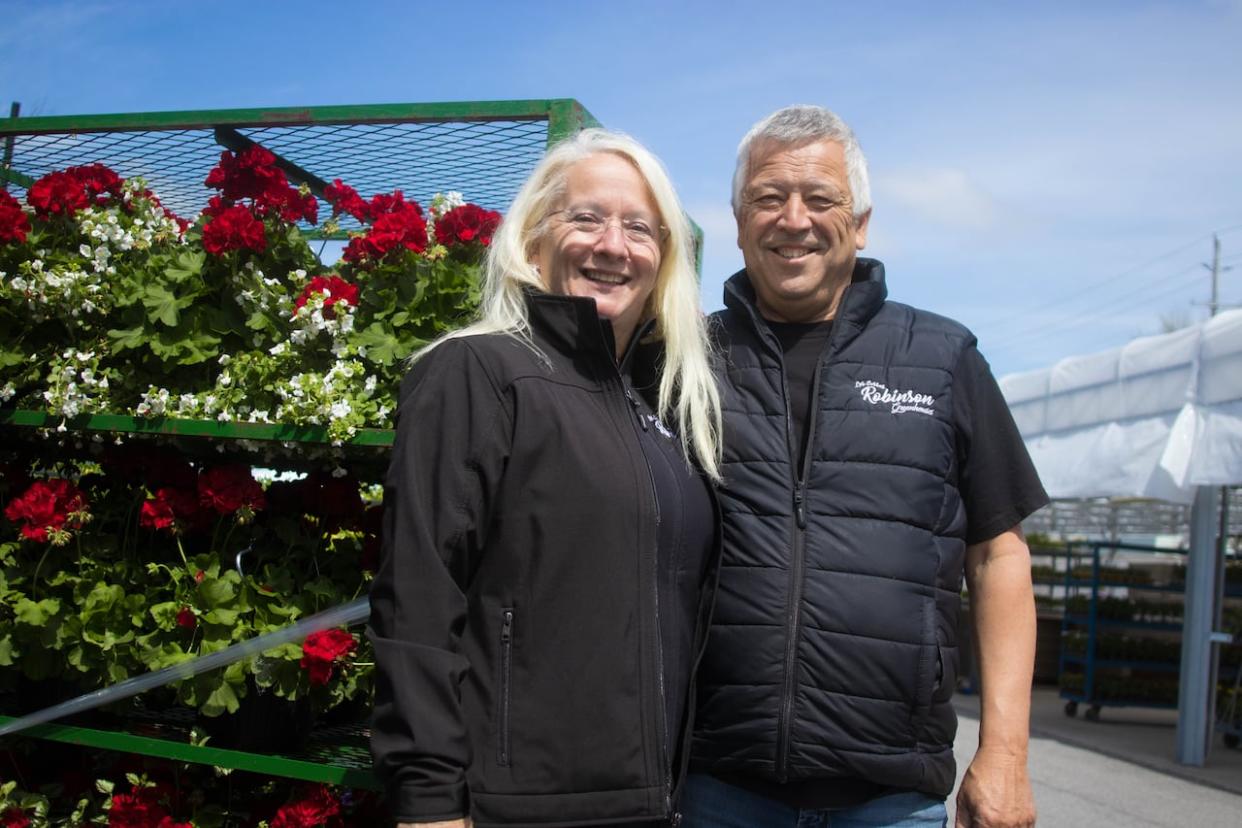
It's been an Ottawa institution for decades, but the Parkdale Market's start was an inauspicious one.
On the morning of July 10, 1924, some 200 basket-toting women showed up at the brand new market at the corner of Parkdale and Wellington streets, according to an article published later that day in the Ottawa Journal.
They'd come out in droves to fill those baskets with fruits and vegetables, the newspaper noted, and would have "cleaned out any farmers' load of produce in five or 10 minutes."
But there was one big problem: thanks to some bureaucratic bungling, not a single farmer showed up.
"Only one day's notice was given by the city of the time it was to open," the Journal reported. "[But] it is not likely it will be discontinued over the poor showing made the first day."
While there would be more uncertainty in the years ahead, that guess would ultimately prove prescient.
And this weekend — with a more gender-diverse customer base, cloth bags instead of baskets, and yes, some actual farmers — the venerable Hintonburg market will officially launch its 100th season in the nation's capital.
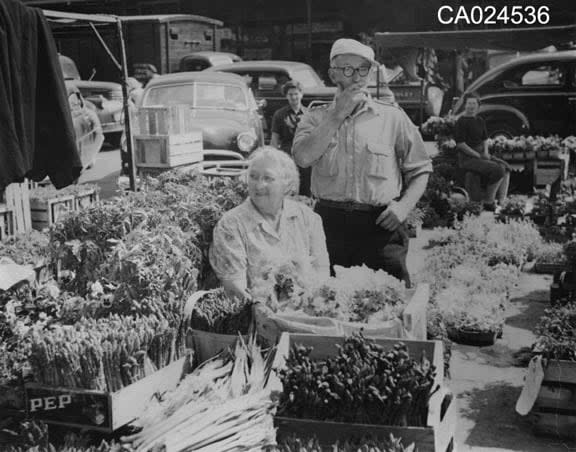
A photo believed to be from the 1950s or 1960s shows members of the Schinzel family at their stand at the Parkdale Market in Ottawa. (City of Ottawa Archives)
A big year ahead
Saturday's festivities will include live music, speeches from dignitaries and the unveiling of a "commemorative fixture" dedicated to the family of Franco Spagnoli, the owner of Osgoode Orchard who had a market stall for six decades before retiring in 2023.
There's a big birthday party slated for July, and on the last day of the season a new documentary will be released.
Plans are also underway for a "pedestrian gallery" on Parkdale Avenue that will showcase photos taken over the past century, said Tina Barton, who serves as the Parkdale Market co-ordinator for the ByWard Market District Authority (BMDA).
"People's consumer habits have changed, of course, in the last 100 years," said Barton, who previously sold prepared vegan fare at the market.
"To see them still show up week after week at a public market and engage with their neighbours, and engage with small businesses ... it feels really special to look back on a full century of that in one neighbourhood. It's really beautiful."
But for decades, the Parkdale Market's presence in Hintonburg was anything but certain.
'Will it or won't it open?'
"It's just had this kind of tumultuous state for almost its entire existence," said Dave Allston, a local historian who runs the website The Kitchissippi Museum and is the master of ceremonies for Saturday's event.
The market opened in 1924 amid demand from locals who wanted an alternative to the bustling, hectic ByWard Market, said Allston, who carried out research for the BMDA for the centennial.
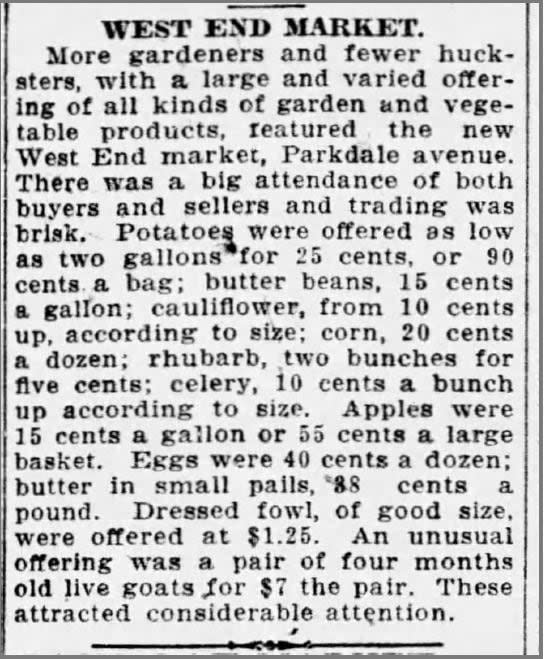
An Ottawa Citizen article from Aug. 23, 1924, lists the prices of various goods for sale — two gallons of potatoes for 25 cents, a dozen eggs for 40 cents, a pair of four-month-old goats for $7. It also notes there were fewer 'hucksters,' vendors who were reselling goods of uncertain origin, according to local historian Dave Allston. (The Ottawa Citizen)
The market went up on a former sawmill site that the city would lease each year from its Montreal-based owner. Farmers would weigh their goods inside an unheated, "rickety old wooden shack" on the site, Allston said. Marketgoers would trudge up and down a wooden sidewalk the city had installed on what was otherwise a dirt field.
In those early years, there was always political opposition, Allston said, as the market wasn't making the city any money.
Each year, council would have to decide if it was worth it to keep leasing the land. And while they always did, they also passed on multiple opportunities to buy it outright — including for relatively cheap during the Great Depression, Allston said.
It wasn't until the 1940s when the city took ownership, expropriating the land from the new owners and overpaying "by three or four grand," he said.
"That's kind of emblematic of how the city's always kind of done this thing. They always kind of dither too long on something, and then they do what they should have done in the first place — and have to pay more for it."
"They put people through stress for years over this. Residents were worried it was going to disappear. Literally, year to year, it was, 'Will it or won't it open?'"
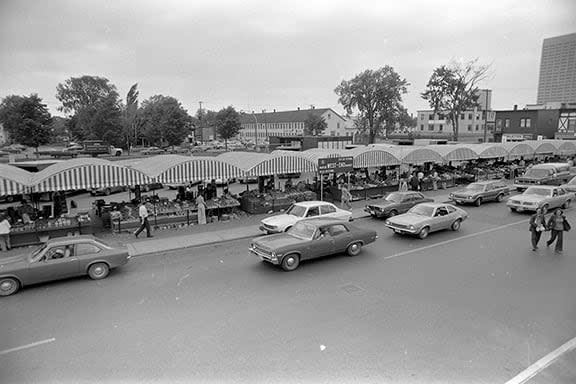
Cars make their way along Parkdale Avenue as people shop at the market on Sept. 9, 1977. (City of Ottawa Archives)
Community stood up for market
In some ways, outright ownership made the Parkdale Market's future even more precarious.
For a "good 15 years," Allston said, the city considered doing other things with the land it now had in its possession, like building a nurses' residence for the nearby Civic hospital campus.
After the Queensway arrived in the 1950s, one committee recommended converting the market site into a parking lot, an idea that came precariously close to passing, Allston said. When Ottawa's streetcar tracks came out, there was talk of moving the market to the newly available space on Byron Avenue.
In some ways, the market's history epitomizes what Allston describes as the "never-ending battle" over city amenities that are nice to have but not critical.
"It's political, right? You're always going to have people [saying things like], 'Oh, we shouldn't be wasting money running a market," he said.
"Thankfully, we've had the right politician or the right community group to fight to protect it through the years."
It's a great time for public space, because we are going to come out and we are going to be with each other. - BMDA executive director Zachary Dayler
But that willingness to protect the Parkdale Market means it's now a focal point for community-building in Hintonburg, with several vendors saying they've built strong connections with patrons who've come out to shop over the years.
"That's what it's all about," said Kornel Schneider, who has run Ferme Rêveuse in Curran, Ont., for 31 years and has been at Parkdale for the past seven.
"We want them to know us," said Schneider of his customers. "They can ask how it's going at the farm, what are your worries ... they have shown many times already that they're there to support us when we need support, and I think we also try to show [our customers] that we will be there for them."
It's a similar sentiment at Robinson Greenhouses, where several generations of the same family have run their market stall over the years.
"Some [people] come on Monday, some come on Tuesday, some come on Wednesday. It's a regular thing," said co-owner Brigitte Robinson, who embraced several customers who happened to be passing by last week as she and her husband Michel got their stand ready for the season.
"My aunt has been here forever. She's up to the third generation. She saw the kids, and the kids grew up, and they became parents, and their kids grew up. People come back year after year."
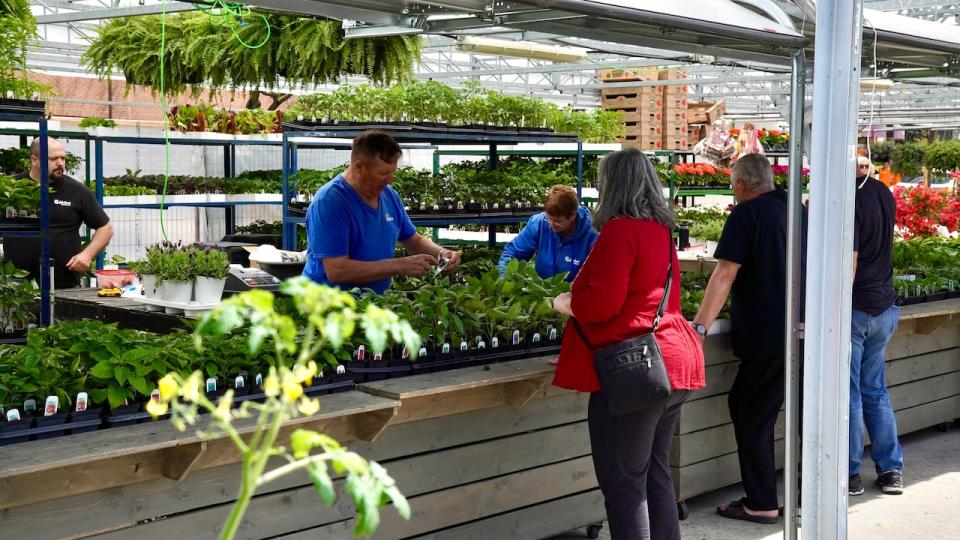
People browse the offerings at the Robinson Greenhouses stall at the Parkdale Market on Friday, one day ahead of the official launch of the market's 100th season. (Patrick Louiseize/Radio-Canada)
Normality during COVID
While the year-over-year existence of the Parkdale Market is no longer in doubt, that doesn't mean there aren't still challenges to deal with.
Over the past decade, the management structure has been in a fair bit of flux, with the volunteer-run Ottawa Markets organization getting off to a rocky start in 2018 and then being dissolved in favour of the BMDA several years later.
Amid all that change was the COVID-19 pandemic, which altered just about everything on Earth — farmers' markets included.
For the Parkdale Market, distancing rules and the like meant vendors had to change how they operate, with customers unable to browse as freely as they once did and transactions being conducted over a table at the front of the stand. (For her part, Robinson says it's helped reduce both damage and theft.)
The BMDA also launched the Parkdale Night Market — the regular market's more hip Wednesday night sibling, with artisans and live music and the occasional craft beer vendor — in the midst of the pandemic.
It was the sort of experience that both Barton and Zachary Dayler, BMDA's executive director, say people were craving.
"When the normality is gone, it comes back in public space," said Dayler. "Everybody was looking for [that]. They wanted a place to be, and the public market provided that."
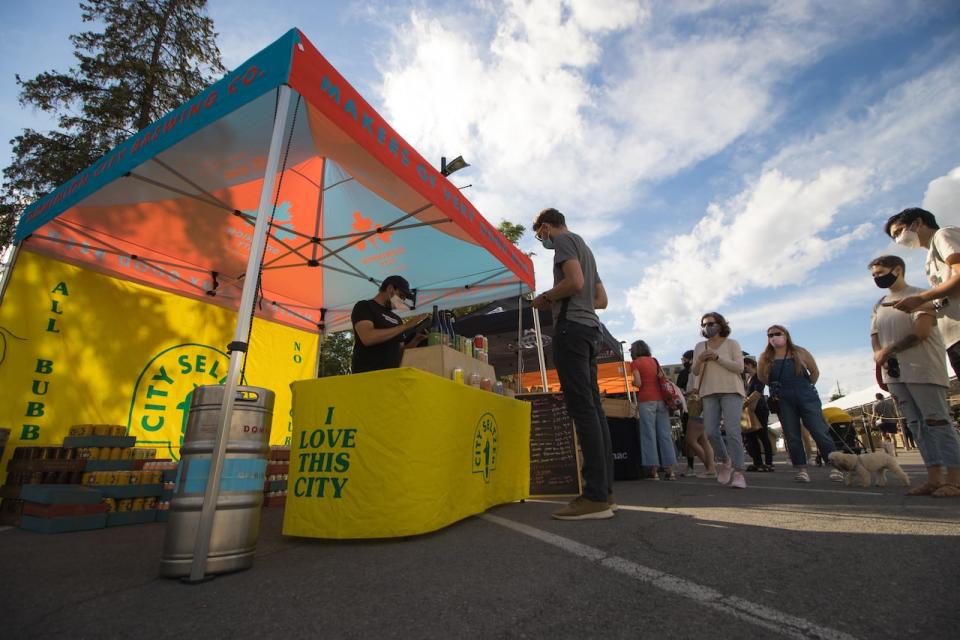
Josh McJannett of Dominion City Brewing, left, rings in a customer's purchase as people wait in line at the Parkdale Night Market in June 2021. (Trevor Pritchard/CBC)
The big challenge on the horizon, Dayler said, will be finding ways to keep the Parkdale Market, where any produce that's sold must be grown in Canada, both affordable and "accessible." It's a major concern, especially in the wake of a cost-of-living crisis that's seen prices soar for many basic necessities.
That's why both Dayler and Barton believe it's important to preserve the "gathering space" element of the market, allowing people to meet there without feeling pressured to spend money.
"Costs are going up. Everybody is stressed and tense," Dayler said. "So I really think it's a great time for Parkdale. It's a great time for public space, because we are going to come out and we are going to be with each other.
"If we limit the space and we really go in that commercial direction, that's not public space. That's not the future."

